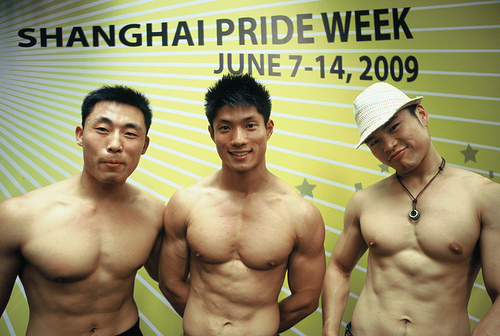Why The Chinese Government Is Not To Blame For Gay Prejudice

A New York Times opinion piece declared Tuesday that China’s one-child policy was putting gay citizens at a disadvantage. The writer said that the pressure to continue the family line, one that once could have been shared amongst siblings, now had to be shouldered by one unfortunate only child.
While the policy certainly exacerbated pressure, the more pertinent question should be directed to the public: is the prejudice against gays and lesbians really only about their ability to reproduce? Is it government-underscored or is the inclination rooted deeper in China’s society?
“In general, the pressure to have an heir is extremely high for everybody, so most gay or lesbian or bisexual people get married and try to have children. I don’t know that that is particularly affected by the one-child policy,” said Brett Sheehan, associate professor of history at the University of Southern California.
The intolerance for homosexuality in China has given rise to a phenomenon known as "homowives" (tongqi), wherein women unknowingly marry gay men and find themselves trapped in loveless marriages. In a 2009 post featured on popular city blog Shanghaiist.com, sexologist and sociologist Li Yinhe wrote, "The 'homowife' phenomenon is a phenomenon unique to China, seldom witnessed in other countries...This difference comes about because Chinese culture places such a great emphasis on marriage and reproduction, as to make them compulsory."
Sheehan also cited the stigmatization of divorce as a reason for its prevalence, "although that's changing very rapidly right now, among the younger generation," he said. "I think there's a lot of embarrassment even to talk about these things."
While the younger generation has been paying particular attention to the issue of gay rights all over the world, what makes China unique is its history of filial piety and extreme parental prejudice.
To this day, ingrained Chinese beliefs give priority to sons over daughters, leading many to slam the one-child policy in stirring a “gendercide,” a term referring to the high influx of abortions of daughters following its enforcement.
The Daily Mail reported in 2010, “In the cruel old China, baby girls were often left to die in the gutters. In the cruel modern China, they are aborted by the tens of millions, using all the latest technology.”
According to the article, it has been estimated that by the year 2020, there will be 30 million more men than women of “marriageable age” in China, causing an unprecedented imbalance in the population.
However, this again begs the question: who is really to blame here, the state or society? The one-child policy, applied to first-borns in 1979, was first and foremost instated for population control; under other circumstances, it may have even played a role in restoring balance to the sexes.
While traditional attitudes have certainly eased since the policy’s establishment – possibly due to the government’s panicked move in directing its resources to prevent further abortions and a general increase in freedom since the country’s economic emergence – the historic mass slaughter of unborn girls has pointed to an unforgettable level of ruthlessness in the Chinese, one that continues to be shown in degrees of variation today in their intolerance of homosexuality.
According to Fan Popo, director of “The Chinese Closet: Being Gay in China,” a man’s father pulled a knife on him upon his revealing that he was gay, and even educational institutions haven’t been showing acceptance. Around 50,000 copies of a free booklet published by the Hangzhou Institute for Educational Research and Northeast Normal University Press have been distributed in the city of Hangzhou since last year, according to the China Daily. The booklet described homosexuality as a “sexual deviance” and was entitled “Parents, Please Walk Your Children Through Puberty.”
What the state needs to do is project more effort toward bridging the gap. Because homosexuality was only decriminalized in 1997 and declassified as a mental illness in 2001, it shouldn't be surprising that preconceived beliefs still linger in parts of the country.
Case in point: in June 2009, the city of Shanghai held the first-ever gay pride festival in the history of the nation, staging a week-long series of drag shows, film screenings and discussion panels. No doubt a momentous milestone for activists, especially given the number of LGBT events that had been canceled because of government interference, but what was missing from the festival highlighted a need for concern. There was no parade in accordance with the ban on public gatherings and all wedding ceremonies performed were strictly “symbolic.”
“In today's China you can be gay," said Bin Xu, director of Common Language, an LGBT support group based in Beijing. "But you can't be political."
The absences in Shanghai Pride Week mirror the gaps in legislation against discrimination. Even in Hong Kong, a Special Administrative Region known for its relatively uncontroversial human rights practices (and for hosting the Mr. Gay Hong Kong pageant), laws for the gay community do not yet exist – in fact, it was only after winning a seat as representative in the Democratic party that DJ-turned-lawmaker Raymond Chan revealed he was gay and announced his hope to create same-sex marriage legislation in the city.
Reach Staff Reporter Michelle Toh here.



